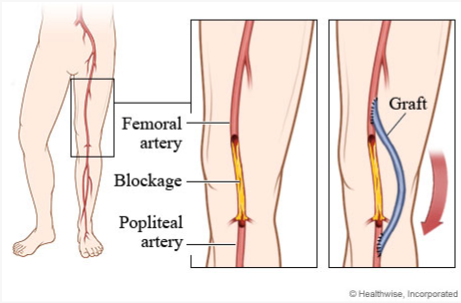A client who has undergone a femoral to popliteal bypass graft surgery returns to the surgical unit. Which assessments should the nurse perform during the first postoperative day?
Assess pulse of affected extremity every 15 minutes at first.
Palpate the affected leg for pain during every assessment
Assess the client for signs and symptoms of compartment syndrome every 2 hours.
Perform Doppler evaluation once daily.
Correct Answer : A,B,C,D
Assess pulse of the affected extremity every 15 minutes at first: Frequent assessment of the pulse in the affected extremity is important to monitor for any changes in blood flow. This allows the nurse to identify any potential complications such as graft occlusion or compromised circulation promptly.
Palpate the affected leg for pain during every assessment: Assessing for pain in the affected leg is crucial to identify any signs of ischemia or inadequate perfusion. Increased pain could indicate reduced blood flow or other complications that require immediate attention.
Assess the client for signs and symptoms of compartment syndrome every 2 hours: Compartment syndrome can occur after vascular surgeries, and early recognition is vital. The nurse should assess for signs and symptoms such as pain, numbness, tingling, increased swelling, and tense compartments. Regular assessment every 2 hours can help detect compartment syndrome promptly and prevent further complications.
Perform Doppler evaluation once daily: Doppler evaluation may be ordered by the healthcare provider to assess blood flow and graft patency. However, the frequency of Doppler evaluation may vary depending on the client's condition and the healthcare provider's orders. Once daily assessment is not sufficient if there are concerns regarding blood flow or graft viability.

Nursing Test Bank
Naxlex Comprehensive Predictor Exams
Related Questions
Correct Answer is C
Explanation
Enalapril (Vasotec) is an angiotensin-converting enzyme (ACE) inhibitor medication commonly used to treat hypertension. One of the potential side effects of ACE inhibitors is hyperkalemia, which is an elevated level of potassium in the blood. Therefore, it is generally recommended for patients taking ACE inhibitors to avoid excessive intake of high-potassium foods.
The charge nurse should intervene because advising the client to increase their dietary intake of high-potassium foods contradicts the precautions associated with taking enalapril. Consuming high-potassium foods while taking this medication can potentially lead to an increased risk of hyperkalemia, which can have serious health consequences.
Let's review the other statements made by the nurse:
"Make an appointment with the dietitian for teaching": This is an appropriate statement as it encourages the client to seek professional guidance on dietary management of hypertension. A dietitian can provide valuable information on healthy eating habits and strategies to reduce blood pressure.
"Check your blood pressure at home at least once a day": This is also an appropriate statement as it promotes self-monitoring of blood pressure, which is important for clients with hypertension. Regular monitoring helps the client track their progress and detect any changes that may require medical attention.
"Move slowly when moving from lying to sitting to standing": This is a correct statement as it advises the client to practice orthostatic precautions. ACE inhibitors, including enalapril, can cause orthostatic hypotension, a drop in blood pressure upon standing. Moving slowly can help prevent dizziness and falls.
Correct Answer is D
Explanation
Monitoring a client after a transesophageal echocardiogram involves observing the client for any immediate post-procedure complications or adverse reactions. This may include assessing vital signs, monitoring for signs of bleeding or infection, and reporting any concerning symptoms or changes in the client's condition to the nurse.
Checking the client's catheter site after a coronary angiogram requires assessing the site for bleeding, hematoma, or signs of infection. This task involves more complex assessment skills and would typically be performed by the nurse.
Teaching a patient about exercise electrocardiography involves providing education on the purpose of the test, the procedure itself, and any preparation or precautions the patient needs to take. This task requires specialized knowledge and is best performed by the nurse who can address the patient's specific questions and concerns.
Attaching ECG monitoring electrodes after a patient bathes requires technical knowledge and skill in properly placing the electrodes and ensuring accurate ECG readings. This task also falls within the scope of the nurse's responsibilities.
Delegation should be based on the UAP's skill set, training, and the complexity of the task. While the UAP can provide valuable support in monitoring a client after a transesophageal echocardiogram, the other tasks mentioned require the expertise and knowledge of a nurse.
Whether you are a student looking to ace your exams or a practicing nurse seeking to enhance your expertise , our nursing education contents will empower you with the confidence and competence to make a difference in the lives of patients and become a respected leader in the healthcare field.
Visit Naxlex, invest in your future and unlock endless possibilities with our unparalleled nursing education contents today
Report Wrong Answer on the Current Question
Do you disagree with the answer? If yes, what is your expected answer? Explain.
Kindly be descriptive with the issue you are facing.
